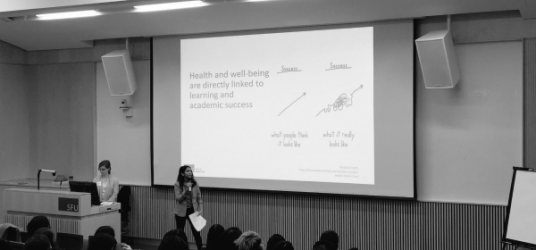
Stress is an unavoidable part of everyday life, and whether you are a student, a recent graduate, or a seasoned professional, it can affect everything from our performance at school and work to our mental and physical health. So, how exactly can we battle stress?
I recently had the opportunity to participate in a seminar called Building Resilience, presented by SFU Public Square in collaboration with SFU Health Promotion and SFU Career and Volunteer Services, where I learned some answers to this question. The seminar was part of Brave New Work, a Community Summit that was dedicated to generating dialogue about the future of work and how to adapt to the new challenges that innovations of the twenty-first century will bring. Building resilience is part of SFU's ongoing efforts to create a Healthy Campus Community initiative, and was the focus of the seminar I and about 50 others attended on March 7th. The first part of the seminar was co-led by Belinda Aikenhead, a Health Peer, and Makshada Kowlessur, a Health Promotion Co-op Student. The students offered tips for building resilience towards stress, drawn directly from the Bouncing Back Canvas course we have here at SFU.
1. Make Connections
Everyone needs support from others, whether they know it or not. Having a strong support network to lean on is essential for success. The people in your support network can include family and friends, or those you feel you can rely on. There are some things that only others can give you, and having a strong support system can help you get through struggles and obstacles. A great way to develop a support network is to join clubs and get to know people who have similar interests. This will help people understand you better and help them to give you guidance.
2. Ask for Help
Help is everywhere around you and there’s no shame in reaching out for it. The most successful people know when to reach out for help and ask for support. This can look different for everyone, and can include everything from seeking help from a counsellor to smaller steps such as talking to a friend. Whatever form it may take, it’s okay to receive help. As the writer Stephen Covey says, "Interdependent people combine their own efforts with the efforts of others to achieve their greatest success."
3. Moving Towards Your Goals
Imagine you had to eat one hundred burgers in a month. How would you do that? Initially, it may seem like a lot of burgers, but if you eat four burgers per day, you would be able to finish one hundred burgers in a month. Along the same lines, when taking on an overwhelming project or a goal that seems out of reach, a great tip is to break it down into smaller, manageable chunks that you can realistically achieve. It’s definitely a better idea than eating one hundred burgers in a day. So, as a student, if you have an assignment coming up and you don't know where to begin, a great way to start is to plan out practical, achievable steps early. This strategy will make it easier to tackle to something that seems overwhelming.
4. Exercise Self-Compassion
It’s easy to get lost in the busyness of everyday life and forget about one of the most important things: you! It is important to understand yourself and your limits as a unique individual. Taking time to intentionally rest and refuel can not only increase your productivity, but also help you avoid burnout down the road. After all, even cars need to visit the gas station every week, so why wouldn’t you need to recharge? Everyone's way of resting can look different. It might be reading a book, playing an instrument, going out for a hike, or going out with friends. Whatever it is, it's important to find a method that works for you.
5. Shifting Perspectives
It is easy to focus on the negative things that happen around you. Because of this, we often miss the positive moments that happen throughout the day. Being optimistic is a skill that can be acquired through practice. By learning to intentionally focus on the positive aspects of your day, you can rewire your brain to be more active in noticing the positive aspects of life. A great way to train up positivity is to keep a journal about the positive things that happen to you each day. It will help build your attentiveness to positive things that happen around you and help you be more optimistic overall!
Everyone experiences stress, and there are many ways to handle it.
These five tips are great for shifting you in the right direction, but it doesn’t stop there! In addition to SFU Health and Counselling Services, The Bouncing Back Canvas course is a great resource available to all SFU students to explore and learn more about being resilient and taking care of your own well-being. If you want to stay updated with what’s new at SFU, Makshada has recently written a blog post about the Healthy Campus Community initiative and the project they have been undertaking to promote student well-being on campus.
Beyond the Blog
-
Help is all around. Plug in to SFU Health and Counselling Services.
-
Check out this article by our very own President Petter introducing Brave New Work.















